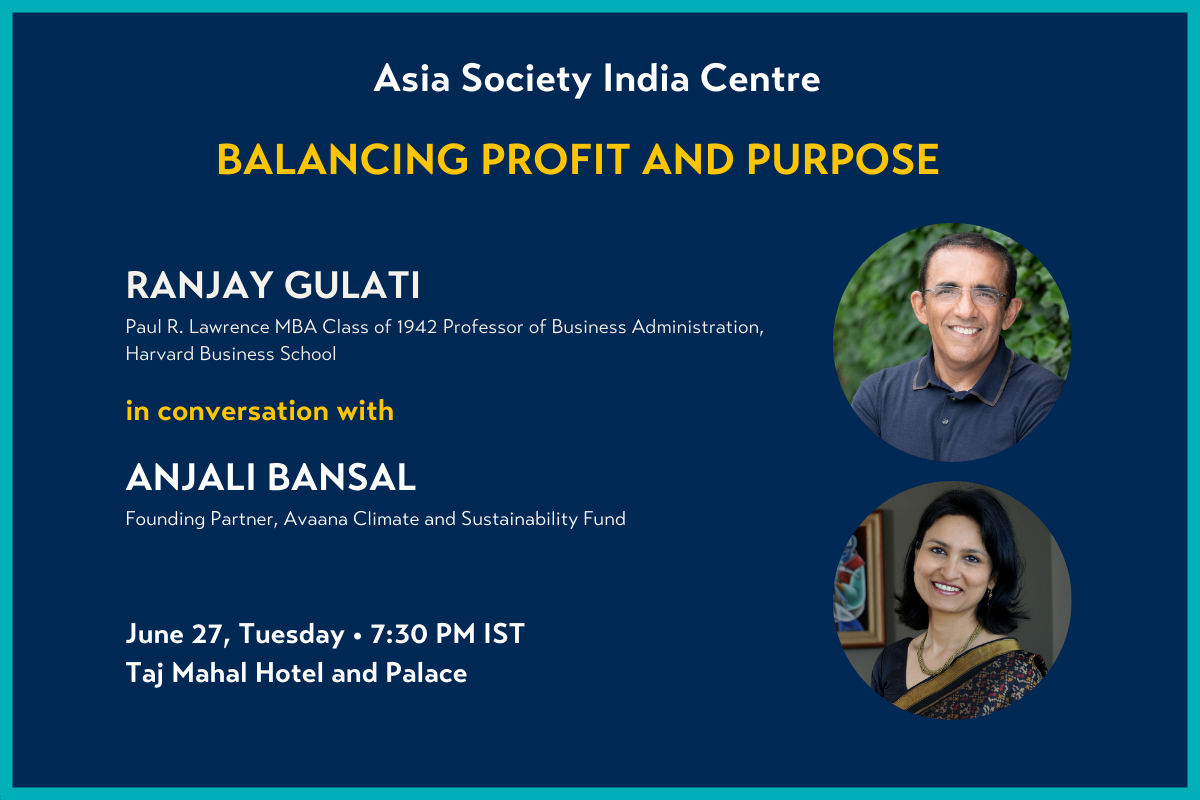Balancing Profit and Purpose
VIEW EVENT DETAILS
In the 1970s, well-known economist Milton Friedman famously said that the purpose of businesses is to make profits – and there is no other imperative to improve society. This view, still held by many in private business today, holds that generating returns on investment and therefore increasing the wealth in society at large is purely the function of business. Finding ‘purpose’ in one’s work is an additional, but not essential, feature of work. However, there is another view too. This view holds that people inherently want to find meaning in life, and in work, and finding purpose can help in longer, more fulfilled careers and more meaningful wealth generation.Purpose-driven leadership is at the forefront of Harvard Business School Professor Ranjay Gulati’s research, and he shows in his book Deep Purpose that companies typically fall somewhere on the spectrum between purpose as secondary to business (for instance, diverted to the CSR department rather than being crucial to core operations) and purpose as win-win – a unique situation where purpose can be beneficial both to society at large and to the bottom-line of the company.
But given the demands of work, as leaders negotiate the difficult terrain of the internal organisation, a web of external stakeholders, pressures to perform and an interconnected and often unreliable business and economy climate, is it hard for leaders to find and embody purpose? How can leaders not only act with purpose but let this message be passed on for everyone else in the organisation to imbibe? And is it practically feasible to lead a profit-focused company with purpose?
Join us for a conversation with Ranjay Gulati, professor at Harvard Business School and author of the book ‘Deep Purpose,’ and Anjali Bansal, founding partner of Avaana Capital, as they explore the questions of purpose, using it to steer the direction of a company, and whether this is compatible with profits for a business in the short- and long- run, especially in the Indian context.

Ranjay Gulati is the Paul R. Lawrence MBA Class of 1942 Professor and the former Unit Head of the Organizational Behavior Unit at Harvard Business School. Until recently, he chaired the Advanced Management Program, the flagship senior leader executive program, at the school. Professor Gulati studies how “resilient” organizations—those that prosper both in good times and bad—drive growth and profitability. His work bridges strategy (establishing clear strategic pillars for growth), organizational design (reimagining purposeful and collaborative organizational systems), and leadership (fostering inspired, courageous and caring execution). Professor Gulati was ranked as one of the top ten most cited scholars in Economics and Business over a decade by ISI-Incite. The Economist, Financial Times, and the Economist Intelligence Unit have listed him as among the top handful of business school scholars whose work is most relevant to management practice. His research has been published in leading academic journals of business, the Harvard Business Review, and a range of other outlets.
He is the author of a number of books. He has been a frequent guest on CNBC and other media outlets. Professor Gulati advises and speaks to corporations large and small around the globe. He also frequently leads small-group workshops focused on helping leadership teams of high-growth companies enhance the growth trajectory of their businesses. Some of his representative speaking and consulting clients include: Abbott Laboratories, Adidas, Aetna, Allergan, Bank of America, Bank of China, Baxter, Berkshire Partners, Blackrock, Boston Scientific, Bristol Myers Squibb, Brown Brothers Harriman, Caterpillar, Credit Suisse, Expedia, Ford, GE, General Mills, Google, Henkel, Hitachi, Honda, Hospira, IBM, Iron Mountain, Kellogg Company, Keybank, KPMG, LaFarge, Lockheed Martin, Merck, Metlife, Microsoft, Mitsubishi, Novartis, Ochsner, P & G, Qualcomm, Sanofi, SAP, Target, Temasek, Unilever, and Vertex. He has served on the advisory boards of several entrepreneurial ventures and has appeared as an expert witness in business litigations. Professor Gulati holds a Ph.D. from Harvard University, a Master’s Degree in Management from M.I.T.’s Sloan School of Management, and two Bachelor’s Degrees, in Computer Science and Economics, from Washington State University and St. Stephens College, New Delhi, respectively. He lives in Newton, Massachusetts.

Anjali Bansal is the Founding Partner of Avaana Climate and Sustainability Fund - investing in technology and innovation-led start-ups catalysing climate solutions and sustainability. Previously, Anjali was the Non-Executive Chairperson of Dena Bank, appointed by the Government of India to steer the stressed bank’s resolution and merger with Bank of Baroda. Prior to that, Anjali was a Global Partner and Managing Director with TPG Growth PE, responsible for India, SE Asia, Africa and Middle East and strategy consultant with McKinsey in New York. Anjali has invested in various successful start-ups including Nykaa, Delhivery, Urban Company, Darwinbox, Farmart, and climate tech leaders like Turno, Terra.do and Eeki. She serves as an independent director on leading boards including Tata Power, Nestle, and Piramal Enterprises. She has been appointed on the Board of ONDC (Open Network for Digital Commerce) and GIFT City, and chairs the Climate Council within IVCA. She is a Member of the Evolution Review Committee for Niti Aayog, India’s premier policy think tank chaired by the Hon’ble Prime Minister. Anjali has previously chaired the India board of Women's World Banking, and served on the boards of GSK Pharma, Siemens, and Bata. She has co-founded and chaired the FICCI program for Women on Corporate Boards.
Anjali is a member of the YPO and a charter member of TiE. She has been listed as one of the Most Powerful Women by India’s leading publications, Business Today, Fortune India and Forbes India. She has a bachelors in Computer Engineering from Gujarat University and a Masters from Columbia University.
Seating is Limited | Prior Registration is Mandatory | Asia Society India members will be given priority for this event
Event Details
To register, please fill in this form.
